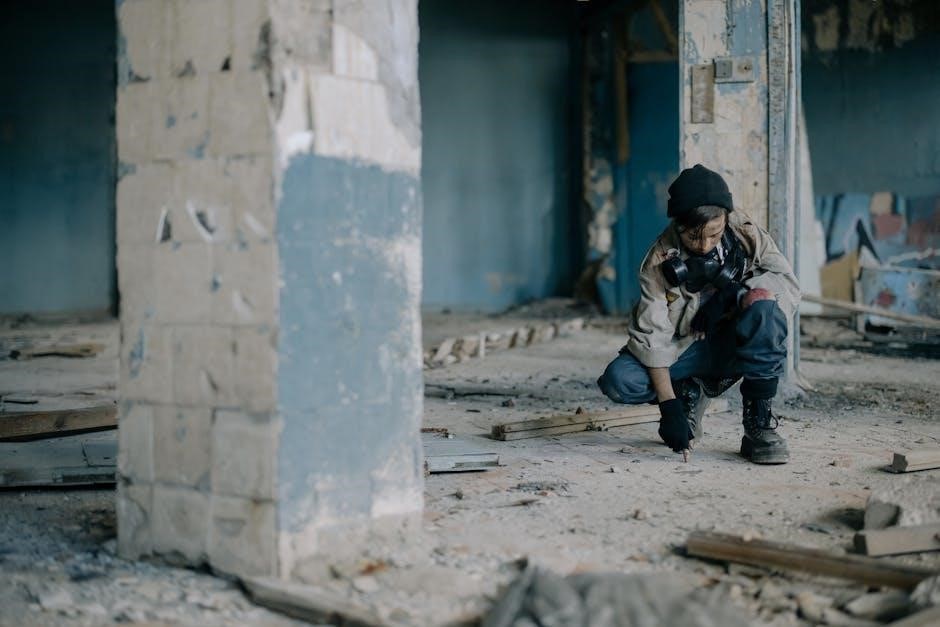Ruined by Lynn Nottage explores resilience and exploitation in a war-torn Democratic Republic of Congo. Set in Mama Nadi’s bar, it highlights women’s survival amidst conflict, earning a Pulitzer Prize.
Overview of the Play
Ruined, a Pulitzer Prize-winning play by Lynn Nottage, delves into the harrowing experiences of women in the Democratic Republic of Congo during its brutal civil war. The story unfolds in Mama Nadi’s bar and brothel, a complex space that serves as both a refuge and a site of exploitation. The play centers on the lives of women like Salima and Sophie, who have been deeply scarred by the conflict. Through their stories, Nottage explores themes of survival, resilience, and the human cost of war. The brothel, owned by the pragmatic Mama Nadi, becomes a symbol of both refuge and exploitation, offering safety from the chaos outside but trapping the women in a cycle of exploitation. Nottage’s vivid storytelling and deep emotional insight make Ruined a powerful exploration of gender, violence, and hope in the face of unimaginable suffering.
Historical and Cultural Context
Ruined by Lynn Nottage is set against the backdrop of the brutal civil war in the Democratic Republic of Congo, a conflict marked by widespread violence, displacement, and human rights abuses. The play reflects the harsh realities faced by women in war-torn regions, particularly the pervasive gender-based violence and exploitation. Drawing from real-life accounts, Nottage sheds light on the resilience of Congolese women amidst unimaginable suffering. The brothel, Mama Nadi’s bar, serves as a microcosm of the broader societal chaos, where women navigate survival amidst exploitation. The play also explores the cultural dynamics of a region deeply affected by colonialism and ongoing conflict. Nottage’s work is deeply rooted in her research and interactions with women affected by war, making Ruined a powerful testament to their stories and struggles.
Plot Summary of “Ruined”
Ruined by Lynn Nottage follows the lives of women in a war-torn Democratic Republic of Congo, centered around Mama Nadi’s bar, a refuge and brothel. The story explores survival, exploitation, and resilience amidst conflict, focusing on characters like Salima and Sophie, who grapple with their pasts and uncertain futures. The play delves into themes of hope, loss, and the strength of women in the face of unimaginable violence, ultimately revealing the human cost of war and the enduring spirit of those affected.
Setting: Mama Nadi’s Bar and Brothel
The play is set in a small mining town in the Democratic Republic of Congo, during its brutal civil war. Mama Nadi’s bar and brothel serve as the central location, offering refuge and business opportunities amidst the chaos. This establishment acts as a neutral space where government soldiers, rebel fighters, and locals gather, creating a complex dynamic of power and survival. The bar symbolizes both safety and exploitation, as it provides women with a means of livelihood while exposing them to further risks. Mama Nadi, the proprietor, navigates this dangerous environment by maintaining a delicate balance of control and compromise. The setting underscores the harsh realities of war and the moral ambiguities faced by those trying to survive in a shattered society.
Main Characters and Their Roles
Mama Nadi, the proprietor of the bar and brothel, is a complex figure who embodies resilience and resourcefulness. She operates her business in a war-torn environment, balancing the needs of her customers with the safety of her workers. Her character represents both strength and moral ambiguity. Salima, a young woman who has been brutalized by the war, struggles to rebuild her life while dealing with physical and emotional scars. Her journey reflects the broader trauma experienced by women in conflict zones. Christian, a local trader, serves as a link between Mama Nadi’s establishment and the outside world, highlighting the economic and social dynamics of the region. These characters, along with others, illustrate the human cost of war and the ways in which individuals adapt to survive in a shattered society.
Themes and Symbolism in “Ruined”
Resilience and exploitation are central themes, with Mama Nadi’s brothel symbolizing both refuge and oppression. The play explores survival, gender roles, and economic reality in a war-torn society.
Resilience and Survival in War-Torn Congo
In Ruined, Lynn Nottage portrays the resilience of women in the Democratic Republic of Congo during civil war. Mama Nadi’s bar serves as a sanctuary where women survive by navigating exploitation. The characters, like Salima and Sophie, endure physical and emotional scars, yet find strength in their shared struggles. Nottage highlights their resourcefulness and solidarity, showing how they adapt to a brutal environment. The play underscores the human spirit’s capacity to persevere despite unimaginable hardship, offering a powerful narrative of survival and hope amidst war’s devastation. Through their stories, Nottage sheds light on the resilience of women in conflict zones, emphasizing their ability to rebuild lives shattered by violence and displacement.
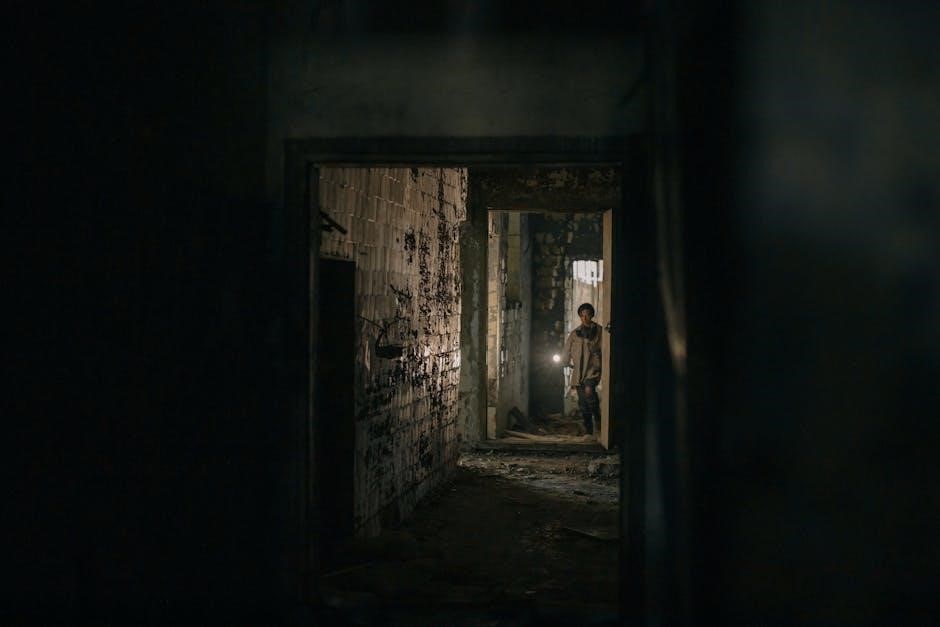
The Brothel as a Symbol of Refuge and Exploitation
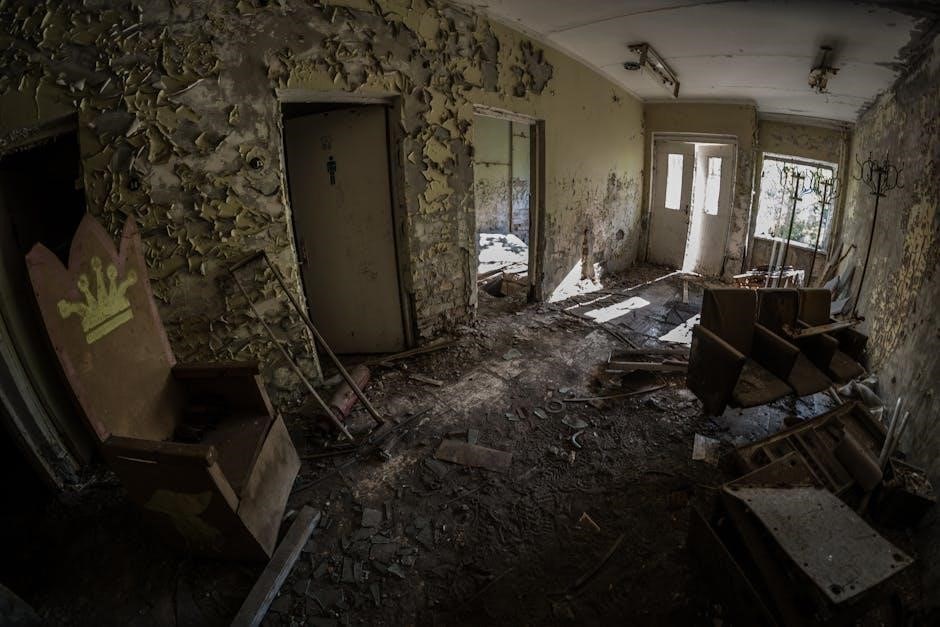
Mama Nadi’s brothel in Ruined serves as a dual symbol of refuge and exploitation. It provides a temporary escape from the war’s horrors, offering food, shelter, and companionship to women fleeing violence. However, it also exploits these women, forcing them into a cycle of commodified survival. Mama Nadi, the brothel’s owner, embodies this duality—she is both a protector and a profiteer. The brothel’s neutrality, welcoming both government soldiers and rebels, highlights its role as a space where survival is traded for safety. Yet, the women inside, like Salima and Sophie, bear the physical and emotional scars of their exploitation. Nottage uses the brothel to critique the commodification of women’s bodies during conflict, while also showcasing their resilience. This complex setting reflects the harsh realities of war, where even refuge comes at a cost, and survival often requires untenable choices.
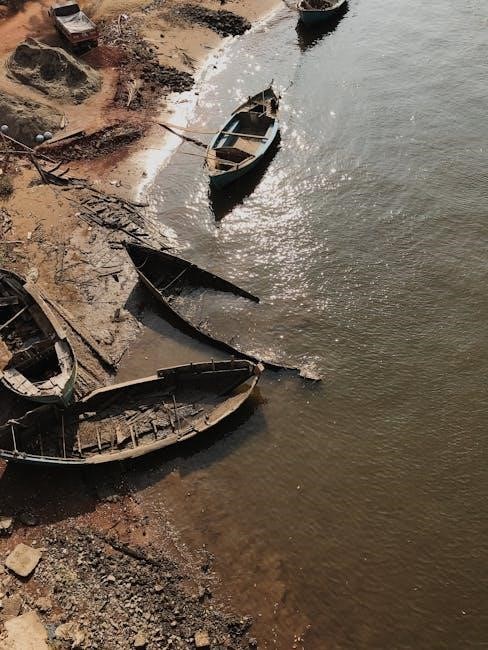
Reception and Awards
Ruined by Lynn Nottage won the 2009 Pulitzer Prize for Drama, earning critical acclaim and audience praise for its powerful portrayal of women’s resilience in war-torn Congo.
Critical Acclaim and Pulitzer Prize
Ruined received widespread critical acclaim for its raw, unflinching portrayal of women’s experiences during the Congolese civil war. The play was awarded the Pulitzer Prize for Drama in 2009, solidifying its place as a landmark work in contemporary theatre. Critics praised Nottage’s ability to balance harrowing narratives with moments of hope and resilience, creating a deeply human story. The Pulitzer committee recognized the play’s “powerful, poignant, and ultimately hopeful” exploration of survival, making it a standout piece in Nottage’s body of work. This accolade not only highlighted the play’s artistic merit but also brought attention to the often overlooked struggles of women in conflict zones. The award cemented Ruined as a modern classic, resonating with audiences globally.
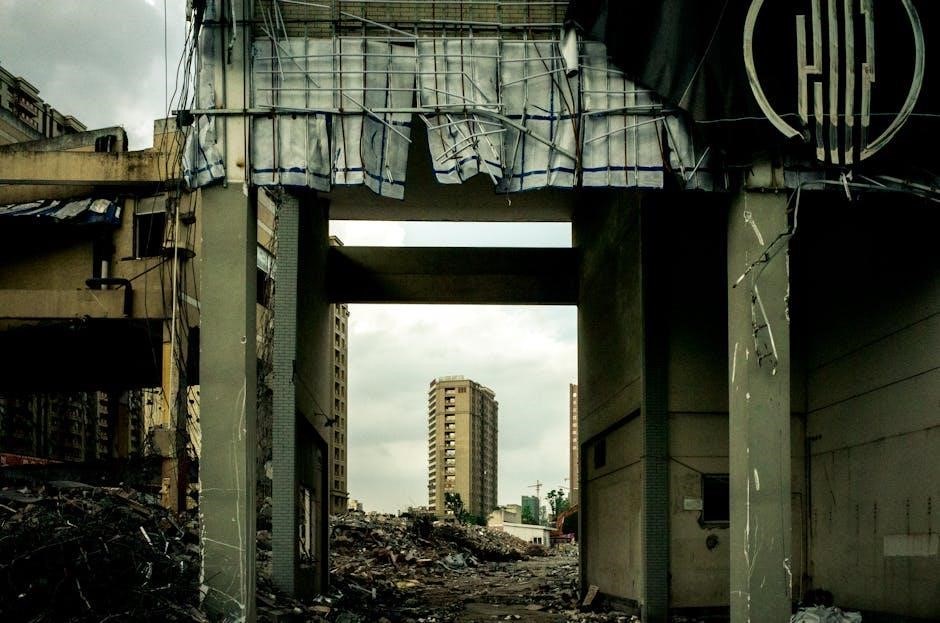
Accessing “Ruined” in PDF Format
Accessing Ruined by Lynn Nottage in PDF format is convenient for readers worldwide; The play is available for download as a PDF file, offering a portable and easily readable version. Platforms like Scribd and online libraries provide free or paid access to the PDF edition, making it accessible to students, researchers, and theatre enthusiasts. The PDF includes the full script, character descriptions, and scene settings, ensuring a comprehensive reading experience. Additionally, the PDF format allows readers to highlight and annotate sections, aiding in deeper analysis. With its widespread availability, the PDF version of Ruined remains a popular choice for exploring Nottage’s powerful storytelling and themes. This digital format ensures that the play’s impactful narrative reaches a global audience, fostering engagement with its critical themes of resilience and survival.
Ruined by Lynn Nottage is a profound exploration of survival, resilience, and exploitation, set against the backdrop of the Democratic Republic of Congo’s civil war. The play’s vivid portrayal of Mama Nadi’s bar as both a refuge and a site of exploitation has resonated with audiences globally. Nottage’s masterful storytelling sheds light on the harrowing experiences of women in conflict zones, earning critical acclaim and the Pulitzer Prize. The availability of Ruined in PDF format has made it accessible to a wider audience, allowing readers to engage with its powerful themes and complex characters. Through its unflinching narrative, Ruined not only highlights the strength of the human spirit but also challenges societal norms and injustices, leaving a lasting impact on all who encounter it.
